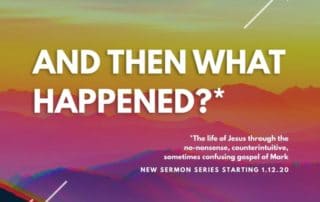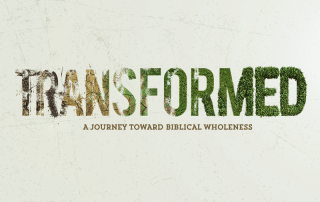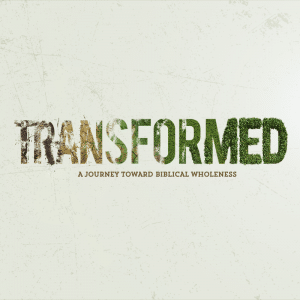And Then What Happened? | What Jesus is All About | Mark 2:13-17 | Week 2
TRANSCRIPT
AND THEN WHAT HAPPENED?: What Jesus is All About Mark 2:13-17 Dr. Scott Wenig
{Manuscript: View Video for complete content} (2nd Service) Good to see all of you today. We’re going to continue our series in the Gospel of Mark today. Last week, Larry gave us a panoramic view of chapter one. Today, I’m going to give us a snapshot of a particular element in chapter two. Before we look at this text, I’m going to ask you to join your hearts together with me in prayer. Father, thanks so much for your provision, your care, your grace in our lives. Lord, we want to thank you for the salvation that you provided for us in the Lord Jesus. Thank you for the grace and the guidance you give us every day. Lord, I thank you for your Church; when she’s filled with your Spirit, she is the hope of the world. I thank you so much for South Fellowship, the ministry that this church has in this community, in this city, and around the world. Lord, I thank you for every person that’s here today, and I thank you that I have the privilege to worship here and now to share from your Scripture. So Lord, as we look into your word, we ask now that by your grace and your Spirit, you would show us who you are, what you’re about, and what that means for us. Father, we ask all of this in the great and glorious name of Jesus and for our sake. Amen.
Notre Dame Cathedral in Paris is one of the most famous buildings in the world. According to the best records, construction on the cathedral began sometime between 1160 and 1163 and was finished about 200 years later. Of greater significance, it served for over eight centuries as one of the finest examples of Gothic medieval architecture ever devised and built. But as you know, last April a section of the cathedral caught on fire, undermining its infrastructure and causing the majestic spire to crumble in a heap. When Notre Dame was built its beauty, majesty, and ministry made it the wonder of all of Europe. But now, after catastrophe, it needs to be saved, restored and made right. And that serves as a metaphor for the condition we find ourselves in today.
A long time ago, there were two beautiful, majestic, and marvelous creatures named Adam and Eve who lived in a paradise called Eden, but they willfully chose to sin against God and consequently, like Notre Dame, they too were ruined. And all of us here are their descendants; we all have poisoned blood in our veins. And because of that we’re hurt, broken and only a shadow of what our Heavenly Father created us to be. I like the way the great pastor and theologian, Fleming Rutledge, put it: “We are all a lot worse off than we think we are.” So, given that reality, we need to be saved, restored and made right, but only something—or more precisely Someone—really powerful and really loving can accomplish that. Fortunately there is such a Person. His name is Jesus and we’re told all about Him in the Gospel of Mark. Most scholars argue that Mark was a close associate of the apostle Peter and so his gospel—this biographical account of Jesus’ ministry, death and resurrection—is based on Peter’s eyewitness account of his experience with the Savior.
In the first few verses of chapter 2, Mark says that Jesus had returned to the city of Capernaum following His itinerant ministry of preaching the Kingdom of God throughout the region of Galilee. And because Capernaum sat next to the Sea of Galilee, Jesus apparently used that location as a regular venue for His teaching and ministry. We see that in verses 13-14. Once again Jesus went out beside the lake. A large crowd came to him, and he began to teach them. As he walked along, he saw Levi son of Alphaeus sitting at the tax collector’s booth. “Follow me,” Jesus told him, and Levi got up and followed him.
Levi (who was also known as Matthew) was a tax collector who worked in or around at Capernaum, and he probably knew Jesus from His coming and going in and out of the city. Now if you’ve been in churchworld for a while or studied the New Testament in detail, you know that tax collectors were at the bottom of the social ladder in ancient Israel because they worked for the Romans and against their own people. Tax collectors hired themselves out to the Roman imperial administration for a specific amount of money that they were required by law to collect. Your employment contract with the Empire forced you to collect enough tax revenue to pay Rome, but anything above and beyond that you could keep for yourself. As you can see that was a system perfectly made for greed, corruption, and oppression, which tax collectors came to personify. The Roman historian Tacitus told of a tax collector who was somewhat honest and, in honor of the fact that he had some degree of honesty, a town built a statue of him. What we need to know is that when a Jew became a tax collector for Rome, he immediately became a social outcast who was viewed as a traitor to his race and nation. He was forever disqualified to serve as a judge or witness in court. He was excommunicated from the synagogue and his disgrace extended to his family. Let me do the best I can to contemporize this a little bit so we’ll get a feel for what Mark is communicating here about this tax collector Levi. Tax collectors were the ancient equivalents of contemporary drug dealers who make lots of money peddling crack cocaine and destroying lots of lives in the process. They were the worst of the worst. The scum of the earth. But the Romans loved them because they enriched the Empire at the expense of their own people.
What is so amazing about Jesus is that He calls this tax-collecting sinner named Levi to ‘follow’ as one of His disciples so that he could be transformed into the type of man God originally intended him to be. Friends, this is where we need to understand the importance of the word ‘follow’. It’s used a number of times in the New Testament and it almost always describes the action of a man or woman answering Jesus’ call to re-direct their lives towards God’s kingdom. It means to start an intimate relationship with Jesus by receiving His forgiveness and then living the new life that Jesus modeled. Over time—and I want to stress this—over time, people who follow Jesus are transformed by His grace.
One of the greatest works of art ever produced in western civilization is Michelangelo’s Pieta in Rome. It’s a marble statue of an anguished Mary holding the crucified Christ. Some years back a fanatic nationalist rushed upon the masterpiece and began smashing it with a sledgehammer. The damage was significant, but a group of Vatican artists were eventually able to restore it to near-perfect condition because they had lots of pictures of the original that they could use to see exactly how Michelangelo had originally made it to be.
Friends, we all know the damage that sin has done in our own lives and in the world around us. We all know how really tangled we are and how tangled the world is, but Mark wants us to know that Jesus is all about transformation and He has inaugurated a kingdom centered in the powerful grace of God, which not only provides forgiveness of sins, but over time, redeems our raggedness as we follow Him. That’s true for you and it’s true for me and Jesus wants it to be true of lots and lots of other people as well. Look at v. 15: While Jesus was having dinner at Levi’s house, many tax collectors and sinners were eating with him and his disciples, for there were many who followed him.
For Jesus to go to this dinner party populated by tax collectors and sinners was both culturally radical and theologically provocative. Religious types of people, especially rabbis like Jesus, weren’t supposed to hang around tax collectors and other really sinful people. But, as a number of commentators have pointed out, when Jesus sat down to eat with them it was a visible sign of fellowship, acceptance, grace, and forgiveness.
C.H. Dodd was a pre-eminent New Testament scholar of the 20th century. It said he had the entire New Testament memorized in Greek. Here’s his comment on this text: “Jesus’ affirmation of the disreputable is not to be confused with the tolerance of a broadminded humanist. It expresses the sovereign mercy of God in calling whom He will into His kingdom.”
Friends, Jesus flaunted the culture of His day and ate with this group of people because He’s all about transformation and He’s all about multiplication. Jesus wants to extend salvation to as many people as possible. So, I’d like to suggest that’s why it’s so important for us to keep John 3:16 at the forefront of our minds: For God so loved the WORLD….(all the tangled, broken, sinful people of the world)…that He gave His Only Begotten Son that Whosoever believes in Him should not perish, but shall have eternal life.
Gilbert Belezikian taught New Testament at Wheaton College in suburban Chicago back in the 1970s and 80s. Dr. B, as he was affectionately known, always had a great heart for taking the Good News of Jesus to lost people and he could get pretty passionate about that. On one occasion, Dr. B was teaching a group of elders, deacons, and ministry leaders in a church in California. And as he did so, he told them that it was clear from the New Testament that a big part of having a church that lived like Jesus was to have a heart for lost people, for those who are currently far from God. And one of the leaders asked, “But isn’t our church supposed to be for people like us?” Well, that pushed one of Dr. B’s buttons and he got pretty amped up and said, “There are lots of churches that are only for Christians and which have no heart for the lost and you can be like them if you want. But whose gonna reach out to all the chain-smoking, wife swapping, whiskey-drinking, tax-cheating, child-neglecting SOBs in this community?” And it got really quiet because no one expected to hear something like that from a New Testament professor. And then one of the deacons said, “You mean sons of Baptists?” Friends, Jesus has a huge heart for all those ‘sons of Baptists’ and He wants us to have that kind of heart as well because he’s all about transformation AND multiplication. So here’s a question I’m laying out for you and for me: Who is ONE person who does not yet know Christ that you’re praying for, reaching out to and building a relationship with that you can invite him or her to church sometime in 2020? Jesus wants you and me and everyone at South Fellowship to be transformed into the men and women He’s called us to be. AND He also wants the exact same thing for all the people we’re related to, all the people we know, and all the people who live and work around us in Littleton, Englewood, and Denver regardless of their age, gender, ethnicity, sexual identity, economic status, or political party affiliation. So, friends, let’s be friendly, let’s be prayerful, let’s build relationships, and let’s invite non-church folks to South in 2020 because Jesus is about transformation and multiplication!
He was willing to do whatever it took show people the love and grace of God. But that’s not something the Pharisees could sign off on. Look at how they respond to Jesus in verse 16: When the teachers of the law who were Pharisees saw him eating with the sinners and tax collectors, they asked his disciples: “Why does he eat with tax collectors and sinners?”
The Pharisees were the spiritual descendants of an earlier Jewish group known as the Hasidim. The Hasidim had stood for obedience to God’s law during the 2nd century b.c. when they were subjected to a horrible persecution by Antiochus Epiphanes IV. The Hasidim were honored for their commitment and endurance in the face of persecution and destruction and rightly so. But as time went on, the core component of Hasidic piety which came to define the Pharisees was the distinction between those who strictly followed all the laws and religious traditions that developed over time and those who didn’t. And by the time of Christ, the Pharisees had divided all of Jewish society into the righteous and the sinners. So, for Jesus as a rabbi to eat and hang out with a group of tax collectors was outrageous and reprehensible in their eyes! From their perspective Jesus was WAY OUT OF BOUNDS! So when they ask why He’s eating with them, it’s not a question as much as it’s a condemnation of Him and all the tangled sinners that He’s eating with.
Jonathan Haidt is a contemporary researcher and writer and in his book The Righteous Mind: Why Good People Are Divided by Religion and Politics, he says that his research has shown that ‘self-righteousness is the normal human condition.’ Ouch! It’s normal for you and me to think we’re better and more pure and more righteous than everyone around us, and that’s why we condemn them when they act and live differently than we think they should—despite the fact that in our heart of hearts we all know that we’re pretty ragged!
Gordon Macdonald {picture} served as chancellor of Denver Seminary—where I have the privilege of teaching—for the last ten years. I’ve gotten to know Gordon pretty well through teaching together and spending time with him and he’s become a good friend. Some of you may remember that back in the late 1990s, former President Bill Clinton got involved in this horrible sordid affair with his intern, Monica Lewinsky. The White House put out a call to Gordon and two other Christian leaders to come to the White House to meet with then-President Clinton to see if they could pastor him and help him come out of this crisis. I talked to Gordon about that on a number of occasions and asked what it was like, and he said, “Well, there were some up sides to that and there were some down sides.” I asked him about the down sides. He said, “The main down side was that as soon as it got out that we were meeting with former President Clinton, the larger evangelical community condemned all three of us, including me.” He said, “People in my church condemned me for doing that. People in my family condemned me and said they didn’t want to be around me anymore!” He said, “You know, I was just trying to get a guy that was really, really tangled up to get him untangled and get him on the path to redemption.”
Friends, Gordon’s experience and the experience Jesus has in this story with the Pharisees, raises at least 2 questions for us: 1) Who are we most likely to condemn? (Democrats, Republicans, illegal immigrants, people of other racial/ethnic backgrounds, members of the trans or LGBTQ communities, rich hedge fund managers, folks who belong to other religious faiths, or the really annoying neighbor down the street?) 2) Do we see others—especially those who might be especially tangled from our perspective—through the lens of condemnation, or do we see them through the possible lens of transformation?
I say this with all sincerity, you could pray for me in this regard. I come from a good family and thank God for my mom and dad who loved me, cared for me, educated me. It wasn’t a perfect family, it had its tangles, but it was a good family. But there was a streak of condemnation that ran through our family and that bled into me. I didn’t grow up in churchworld, but the very first church that I became a part of, I rise up and thank God for that church. That church taught me to read the bible and pray, the importance of worship and fellowship, the value of consistent giving. I’m so grateful for that church and what it did for me, but there was a streak of condemnation that pervaded that church and it seeped into me. By the grace of God I think I’m making progress, but I know I have a long way to go. And that’s why studying this text about how Jesus inaugurated a Kingdom that’s all about transformation and multiplication rather than condemnation is so very beneficial to me and hopefully to you as well. Let’s try to remember what C.S. Lewis once wrote: “It is a serious thing to live in a society of possible gods and goddesses, to remember that the dullest most uninteresting person you can talk to may one day be a creature which, if you saw it now, you would be strongly tempted to worship, or else a horror and a corruption such as you now meet, if at all, only in a nightmare. There are no ordinary people. You have never talked to a mere mortal…it is immortals whom we joke with, work with, marry, snub, and exploit – immortal horrors or everlasting splendors.”
Friends, people matter to God and He wants them to enter His kingdom, receive His forgiveness, and, over time, become all He made them to be. That’s why He’s all about transformation and multiplication rather than condemnation, and in His response to the Pharisees in verse 17, He takes this one step further: On hearing this, Jesus said to them, “It is not the healthy who need a doctor, but the sick. I have not come to call the righteous, but sinners.” Jesus makes a common sense observation here and ties it to His mission: Only sick people need a doctor and so He’s come to call people to Himself who realize that they’re infected with the disease of sin. And in this statement, He implies that the Pharisees saw themselves as ‘the righteous’ who, in their self-delusion cannot see their own tangles and sin. They can’t see that—in their own religious way—they’re just as far from God as all those tax collectors and sinners. They were spiritually blind to their own need of transformation that Jesus came to bring.
The core issue here is theology: Who is God and what is He all about? The Pharisees believed that only obedience to God’s laws in the Old Testament and the traditions of the elders would lay the proper foundation for the arrival of God’s kingdom. Since the majority of people were never going to devote their lives to that impossible task, the Pharisees became spiritual isolationists. They sincerely believed they were the one true group of God followers; they were the righteous ones that God liked and approved of. So, when Jesus arrives and begins to teach that God’s kingdom was open to everyone and anyone who acknowledged their need of His grace and forgiveness that totally messed with their theology of isolation.
I’ve read enough church history to know that theologies of isolation have popped up in the history of the church over time. Recently it popped up in a book called The Benedict Option. When this book came out about three years ago, it got a tremendous amount of publicity. I was really excited about it because I’m a church historian and he’s writing about the ancient Benedictine movement and I wanted to see what he said. Here’s what it says on the inside cover: “Today a new post-Christian barbarism reigns. Many believers are blind to it and their churches are too weak to resist. Politics offers little help in this spiritual crisis. What is needed is the Benedict Option, a strategy that draws on the authority of scripture and the wisdom of the ancient church. The goal is to embrace exile from mainstream culture and construct a resilient counter-culture.” Well, I read the book and apart from the fact that Dreher completely misunderstands and misinterprets the Benedictine movements of the sixth through eighth centuries, he makes some good points. He talks about the fact about how overly sexualized and weird sexually our culture has become. And he’s right. He talks about the fact that technology now dominates our culture in ways that we could not have conceived of thirty years ago. And he’s right. But the core issue of this book is that it’s based on fear—fear of being contaminated, fear of losing our kids to secularism, fear of losing our souls. Friends, you can’t live the Christian life and follow Jesus and totally be motivated by fear. And that doesn’t work in life anyway. What we don’t often admit or think about or talk about is that, by its very nature, life is risky and dangerous. In theory: When you get into your car, you could easily get killed. When you go out to eat, you could easily get food poisoning. This isn’t likely but in theory, when you fly on airplane you could possibly end up in a crash. But none of us are going to quit driving, flying, or eating out. Friends, we’re simply not going to isolate ourselves in those ways and the Church should never, ever isolate herself either. In fact, the Church should exemplify a theology of engagement, where she puts herself and her resources on the front lines, reaching out to tangled and lost people all over the place, because her Lord Jesus is all about transformation and multiplication and never about condemnation or isolation!
This story in Mark 2 is revolutionary because it shows us that Jesus, who is God incarnate and Israel’s long-awaited Messiah, invited one of the worst of the worst of ancient Jewish society to follow Him as a disciple, and then had an intimate lunch with all his bad-guy buddies in order to get them to do the same! See, this story calls for some theological reflection on our part. What does this story tell us about God? What does Jesus’ public action here tell us about God’s heart for people, especially fallen, broken, sinfully ragged people? Is God the God of condemnation and isolation or is He the God of transformation and multiplication?
About two-and-a-half years ago, Aaron was gone and had a friend of his (and mine), Jake Gosselin, come in to lead worship. He led us in a song that I’ve come to love because it exemplifies who are God really is and what are God is really about. It’s called “Reckless Love.” The chorus says: Oh, the overwhelming, never-ending, reckless love of God // It chases me down, fights ’til I’m found, leaves the ninety-nine // I couldn’t earn it, I don’t deserve it, still You give Yourself away // Oh, the overwhelming, never-ending, reckless love of God. Friends, Jesus exemplifies, personifies, and magnifies the overwhelming, never-ending reckless love of God, because He is always about transformation and multiplication, and He is NOT about condemnation and isolation. May all of us here at South Fellowship, by His grace and with His love, be about the exact same things that He’s about.
Let’s pray. Father, we thank you for your grace, which you’ve poured out on us in Christ. Help us to take that grace and, in the right way, at the right time with the right person, extend that grace so that we can see your kingdom extend to more and more and more people throughout 2020 and beyond. Lord, we love you, we thank you. Lord, may you watch over us and be with us this day. In your name we pray. Amen.








